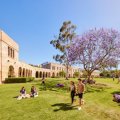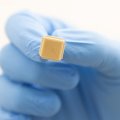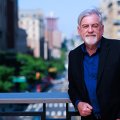A new Queensland Government Fellowship presented today by the Governor of Queensland will be used by a researcher to try to combat an extreme super bug even more aggressive than resistant Staphylococcus strains.
Queensland Health and University of Queensland researcher Professor David Paterson received a Senior Clinical Research Fellowship to stem the invasion of mega super bugs, which are resistant to all antibiotics and current treatments.
Professor Paterson - an infectious diseases researcher at UQ’s Centre for Clinical Research (UQCCR) and the Royal Brisbane and Women’s Hospital – received the Fellowship from the Office of Health and Medical Research (OHMR).
Professor Paterson said the new strain of bacteria had "extreme drug resistance" or XDR.
“These are real super bugs, far worse than MRSA (the Methicillin Resistant Staphylococcus aureus) and even the more aggressive Community Acquired MRSA strain,” he said.
“There are currently no treatment options at all.”
Professor Paterson is one of three researchers to receive a total of $8.5 million in inaugural Senior Clinical Research Fellowships.
The recipients were chosen from a pool of national and international applicants, with their awards presented today at the UQCCR by Her Excellency Dr Penelope Wensley AO, Governor of Queensland.
Fellow UQ and Queensland Health researchers Professors Peter Sly and Thomas Marwick will research respiratory diseases in children and diagnostic testing in rural areas respectively.
Professor Sly will relocate from Western Australia to conduct his research at the Royal Children’s Hospital and Professor Marwick will continue his work at the Princess Alexandra Hospital.
The fellowship awards represent a significant funding boost for Queensland Health’s research sector.
Deputy Premier and Health Minister Paul Lucas said the research would help provide more dependable, better health care for Queenslanders.
“These fellowships will increase collaboration between our health facilities and universities, help translate research into practice and support junior researchers,” Mr Lucas said.
Professor Paterson said the mega super bug was already a health issue in parts of Asia, with outbreaks in some major hospitals in the region.
“There’s the potential to see these strains in Australian travellers returning home after hospitalisation in these areas,” he said.
Professor Paterson will work to find a chink in the super bug’s seemly impenetrable armour - why it is so resistant, how it is being spread - and develop a new antibiotic to combat it with colleagues from UQ’s Institute for Molecular Bioscience.
His fellowship is part of a $20.55 million Health and Medical Research Program administered by the OHMR to attract and retain leading clinical researchers to Queensland’s publicly funded health facilities.
The fellowships are part of the Research for a Healthier Future:2020 Health and Medical Research and Development Strategy, which aims to recruit, develop and retain a skilled health research workforce, promote the transfer of knowledge into improved health and wealth, provide clear leadership and promote research collaborations.
“We’re confident these outstanding recipients can help us meet our priorities by translating research into practice,” Mr Lucas said.
“To reach our Toward Q2: Tomorrow’s Queensland ambition to make Queenslanders Australia's healthiest people, we have to support research to improve health initiatives and generate growth in the health and medical research sector.”
Applications for the second round of fellowships close on March 1, 2010.
Media inquiries:
Queensland Health Public Affairs Officer – 3234 1439
UQ Health Sciences Faculty Communications Manager, Marlene McKendry - 0401 99 6847
.jpg)










